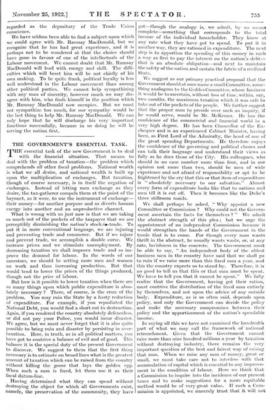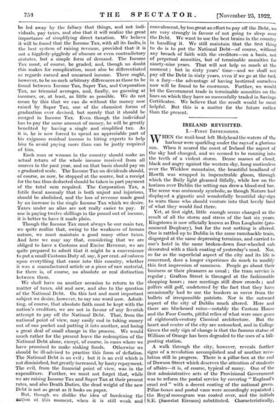THE GOVERNMENT'S ESSENTIAL TASK. T HE essential task of the new
Government is to deal with the financial situation. That means to deal with the problem of taxation—the problem which comprehends all other fiscal problems. National wealth is what we all desire, and national wealth is built up upon the multiplication of exchanges. But taxation, though of course necessary, is in itself the negation of exchanges. Instead of letting men exchange as they desire, the tax-gatherer compels them at the point of the bayonet, as it were, to use the instrument of exchange— their money—for another purpose and so diverts human energy into another and an unproductive channel.
What is wrong with us just now is that we are taking so much out of the pockets of the taxpayer that we are perceptibly diminishing the nation's stock-is-trade. To put it in more conventional language, we are injuring and preventing trade and commerce. But if we injure and prevent trade, we accomplish a double curse. We increase prices and we stimulate unemployment. By decreasing taxation we shall improve trade and so im- prove the demand for labour. In the words of our ancestors, we should be setting more men and women on work and thus increasing production. But that would tend to lower the prices of the things produced, though not the price of labour.
But how is it possible to lower taxation when there are so many things upon which public expenditure is abso- lutely necessary ? There, of course, is the crux of the problem. You may ruin the State by a hasty reduction of expenditure. For example, if you repudiated the National Debt, you would find a short cut to destruction. Again, if you rendered the country absolutely defenceless, or did not pay your Police, you would incur disaster. We agree, but we must never forget that it is also quite possible to bring ruin and disaster by persisting in over- taxation. Here, in truth, as in all political matters, you have got to contrive a balance of evil and of good. This balance it is the special duty of the present Government to discover. We suggest to them that the first thing necessary is to estimate on broad lines what is the greatest amount of taxation which can be raised from the country without killing the goose that lays the golden egg. When such a sum is fixed, let them use it as their fiscal datum-line.
Having determined what they can spend without destroying the object for which all Governments exist, namely, the preservation of the community, they have got—though the analogy is, we admit, by no meant complete--something that corresponds to the total income of the individual householder. They know at any rate what they have got to spend. To put it in another way, they are rationed in expenditure. The next step is to apportion the spending of this money in such a way as first to pay the interest on the nation's debt— that is an absolute obligation—and next to maintain the safety of the nation and sustain the fabric of a civilized State.
We suggest as our primary practical proposal that the Government should at once name a small Committee, some- thing analogous to the Geddes Committee, whose business it would be to ascertain, without loss of time, within, say, two months, the maximum taxation which it was safe to take out of the pockets of the people. We further suggest that the proper man to preside over such an inquiry, if he would serve, would be Mr. McKenna. He has the confidence of the commercial and financial world in a very high degree. He has been Chancellor of the Ex- chequer and is an experienced Cabinet Minister, having been, as First Lord of the Admiralty, the head of one of the great spending Departments. He therefore enjoys the confidence of the governing and political classes and can talk their language and understand their views as fully as he does those of the City. His colleagues, who should in no case number more than four, and in our opinion not more than two, should be men of wide experience and not afraid of responsibility or apt to be frightened by the cry that this or that item of expenditure is " absolutely necessary to our salvation." Almost every form of expenditure looks like that to nations and men till it is cut off. Then it becomes like the Duke's three stillroom maids.
We shall perhaps be asked, " Why appoint a new Committee or Commission ? Why could not the Govern- ment ascertain the facts for themselves ? " We admit the abstract strength of this plea ; but we urge the appointment of an independent Commission because it would strengthen the hands of the Government in the tussle that is to come. For though every man wants thrift in the abstract, he usually wants waste, or, at any rate, lavishness in the concrete. The Government must be able to say, " An independent body of the ablest business men in the country have said that we shall go to ruin if we raise more than this fixed sum a year, and this the country expects us to stand by. Therefore, it is no good to tell us that this or that sum must be spent. We have to tell you that it cannot be spent." We fully realize that the Government, having got their ration, must contrive the distribution of the fixed sum entirely by themselves, and not upon the advice of any outside body. Expenditure, as is so often said, depends upon policy, and only the Government can decide the policy and make the necessary compromises between their policy and the apportionment of the nation's spendable income.
In saying all this we have not examined the hundredth part of what we may call the framework of national retrenchment. Given that the Government cannot raise more than nine hundred millions a year by taxation without destroying industry, there remains the very important question of the best and fairest way of raising that sum. When we raise any sum of money, great or small, we must take care not to interfere with that accumulation of capital which is essential to any improve- ment in the condition of labour. Here we think that a Commission to inquire into the incidence of our present taxes and to make suggestions for a more equitable method would be of very great value. If such a Com- mission is appointed, we sincerely trust that it will not be led away by the fallacy that things, and not indi- viduals, pay taxes, and also that it will realize the great importance of simplifying direct taxation. We believe it will be found that the Income Tax, with all its faults, is the best system of raising revenue, provided that• it is not a higgledy-piggledy of obscure or even contradictory statutes, but a simple form of demand. The Income Tax must, of course, be graded, and, though no doubt this makes for complication, must also be differentiated as regards earned and unearned income. There ought, however, to be no such arbitrary differences as those to be found between Income Tax, Super Tax, and Corporation Tax, no triennial averages, and, finally, no guessing at incomes, or, at least, as little as possible. We do not mean by this that we can do without the money now raised by Super Tax, one of the clumsiest forms of graduation ever devised, but merely that it should be merged in Income Tax. Even though the individual has to pay the same amount of money, he will be greatly benefited by having a single and simplified tax. As it is, he is now forced to spend an appreciable part of his exiguous residual income in hiring experts to help him to avoid paying more than can be justly required of him.
Each man or woman in the country should make an actual return of the whole income received from all sources in the past year, and on that basis should pay on a graduated scale. The Income Tax on dividends should, of course, as now, be stopped at the source, but a receipt for the tax thus deducted should be taken in part payment of the total sum required. The Corporation Tax, a futile fiscal anomaly that is both unjust and injurious, should be abolished, and the loss of revenue made good by an increase in the single Income Tax which we desire. Taxes under an alias are not really easier to pay. If one is paying twelve shillings in the pound out of income, it is better to have it made plain.
Though the Income Tax must always be our main tax, we quite realize that, owing to the weakness of human nature, we must maintain a good many other taxes. And here we may say that, considering that we are obliged to have a Customs and Excise Revenue, we are quite prepared to admit that it might be a convenience to put a small Customs Duty of, say, 5 per cent. ad valorem upon everything that came into this country, whether it was a manufactured article or a piece of raw material, for there is, of course, no absolute or real distinction between them.
We shall have on another occasion to return to the matter of taxes, old and new, and also to the question of the National Debt. On this last and most important subject we desire, however, to say one word now. Admit- ting, of course, that absolute faith must be kept with the nation's creditors, we are not in favour of any feverish attempt to pay off the National Debt. That, from the national point of view, may easily end in taking money out of one pocket and putting it into another, and losing a great deal of small change in the process. We would much rather for the present leave the redemption of the National Debt alone, except, of course, in cases where we have promised to make sinking funds. Otherwise we should be ill-advised to practise this form of deflation.
The National Debt is an evil ; but it is an evil which is not diminished, but greatly increased, by hasty repayment. The evil, from the financial point of view, was in the expenditure. Further, we must not forget that, while we are raising Income Tax and Super Tax at their present rates, and also Death Duties, the dead weight of the new Debt is not as great as it looks on paper. • But, though we dislike the idea of burdening the patjon. at Allis moment, when it is still weak and convalescent, by too great an effort to pay off the Debt, we are very strongly in favour of not going to sleep over the Debt. We want to use the best brains in the country in handling it. We still maintain that the first thing to do is to put the National Debt—of course, without any breach of faith with the creditors—on a basis, not of perpetual annuities, but of terminable annuities for ninety-nine years. That will not help us much at the moment ; but in sixty years' time—and we shall not pay off the Debt in sixty years, even if we go at the task in a fury—the advantage of having bestirred ourselves now will be found to be enormous. Further, we would let the Government trade in terminable annuities on the lines on which they have so successfully traded in Savings Certificates. We believe that the result would be most helpful. But this is a matter for the future rather than the present.











































 Previous page
Previous page